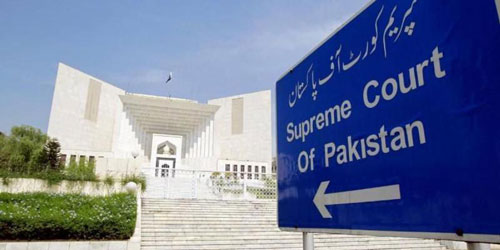Gives ‘free hand’ to Govt to control law and order situation
The Supreme Court on Thursday rejected the federal government’s request to issue an interim order against PTI chief Imran Khan to bar him from what authorities described as creating a perceived law and order situation in the name of “jihad” against the state through a planned long march.
However, the court gave the government a “free hand” to control the law and order situation and warned that it would intervene if any party violated court orders.
The request’s dismissal came during the hearing of a contempt petition filed by the federal government against Imran for allegedly flouting the top court’s May 25 order regarding the party’s “Azadi March”.
In the same plea, the government sought a restraining order against the former PM from creating a perceived law and order situation through an intended march, specifically at a time when flood-affected people require urgent relief.
A five-judge Supreme Court bench headed by Chief Justice of Pakistan Umar Ata Bandial heard the petition. Apart from the CJP, the bench consisted of Justice Ijazul Ahsan, Justice Munib Akhtar, Justice Yahya Afridi and Justice Sayyed Mazahar Ali Akbar Naqvi.
During the hearing, Attorney General of Pakistan Ashtar Ausaf argued that citizens’ rights had been affected by the PTI’s previous sit-in. The party had submitted an affidavit stating that citizens would not be inconvenienced, he informed the court.
“The court order allocated a specific place but the sit-in was brought to D-Chowk, which resulted in material losses. The court should punish those who violated its orders,” he urged.
Imran had issued a call for workers to gather at D-Chowk despite assuring the court he would not do so during proceedings, the AGP recalled. The Srinagar Highway was opened for traffic on the court’s order. The PTI itself asked for Parade Ground but the workers gathered at D-Chowk instead, he added.
“[Party] workers came towards the Red Zone where there were clashes with law enforcement agencies. Protesters damaged public and private properties,” Ausaf continued, adding that during the proceedings that culminated in the SC’s May 25 order, the PTI’s lawyers were in contact with the party leadership.
“When the reports were submitted, it was found that PTI had violated the assurances [it gave the court],” the AGP said. He informed the court that he had not been provided copies of the reports, at which the bench assured that he would be given the reports.
Ausaf informed the court that policemen from Khyber Pakhtunkhwa and Azad Jammu and Kashmir had also entered the capital during the march.
The bench then provided the AGP reports from the police and administration regarding that day’s events and asked him to analyse them.
Ausaf asked the court to issue an interim order. When the chief justice asked what the attorney general wanted, the latter replied, “Imran is calling the attack on Islamabad a jihad. He is inciting people through his speeches.
“It is the state’s responsibility to protect citizens’ fundamental rights.”
“According to you, the court order had already been violated. You were the executive authority and following the court order.










